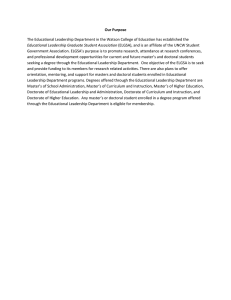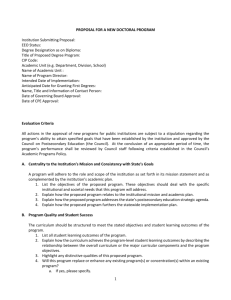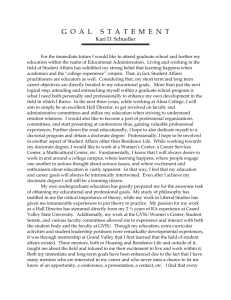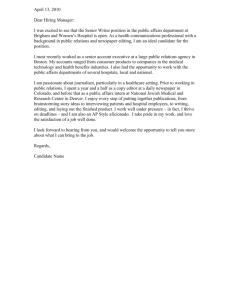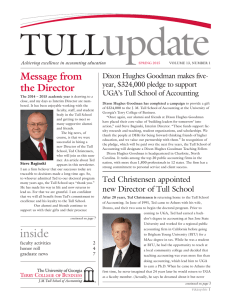Unmasking Your Potential - Mid-Atlantic Association of College and
advertisement
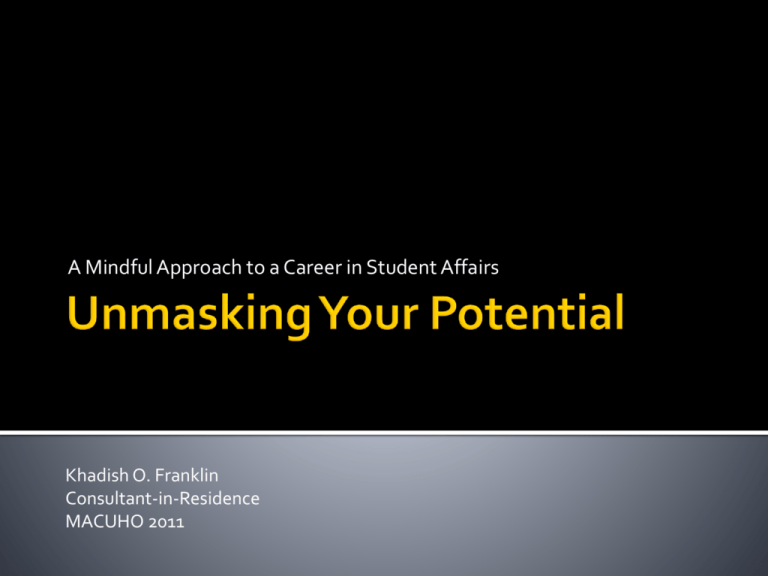
A Mindful Approach to a Career in Student Affairs Khadish O. Franklin Consultant-in-Residence MACUHO 2011 Introductions Mindful Career Model Retention & Attrition in the Field Steering Career Paths Doctorate for Career Success? Career Planning Model Questions and dialog Attrition from field: 39% - 68%, No difference between specialty areas (Ward, 1995) Higher among women (Burns,1982) It starts in Graduate School: Skills building Setting realistic expectations (Ward, 1995) (Renn & Jessup-Anger) “Falling into” Student Affairs (Evans, 1988) (Lorden,1998) Job opportunities Many entry level positions, not so many mid-level (Evans, 1988) Autonomy & Role Stress Autonomy and recognition of “professionalism” of staff key to satisfaction and retention (Ward, 1995) (Winston & Creamer, 1997) (Tull, 2008) Role Stress – Ambiguity and Conflict (Ward, 1995) (Tull, 2008) Factors that influence path: Same as in your job search, it is important to know what those are. It’s your path, not the mythical norm’s path. The “rules” of Higher Education Careers Don’t Get Pigeon-Holed : Functional Areas Move On to Move Up : Job Hopping, or Not Work-Life Balance (or Burnout) To PhD or not to PhD Don’t Get Pigeon-Holed : Functional Areas The Role of Graduate Assistantships First Job Out How to Transition Move On to Move Up : Job Hopping, or Not 3-5 years..really? Institutional Considerations Reputation Management Work-Life Balance (or Burnout) Is Balance Achievable Role Modeling Managing Up To Ph.D. or not to Ph.D. How to decide Choosing an institution A doctorate may assist with advancement and credibility in student affairs A professional may be effective and acquire promotions and lateral mobility from within without acquiring a doctorate Most career advancements for mid-management and upper management require the doctoral credential Prospective doctoral students without prior experience may not be able to obtain an administrative position in higher education with the doctoral alone Common among senior student affairs officers in all types of institutions Held by 52.4% of senior student affairs officers in a college survey Most common at public universities and that exception increases with the institution’s size The doctorate appears less essential for departmental head positions The masters was the highest earned for 64.1% of the 1,148 directors and doctorates were weld by only 22.5% of positions such as directors of student life, student services, and student development Why We Choose to Enter the Field/Get Master’s Frame of Mind Leaving the Master's Program Focus during the 1– 3 Years Direction during the 3 – 5 Years Shaping the Future Self reflection is the most important aspect of career success. No one knows you like you! If you can identify your weaknesses & bad habits you can set a plan to address them. You can use professional feedback as an opportunity to modify behaviors and develop new habits. Use your time strategically Utilize your membership in professional associations Stay abreast of current research and trends Research other colleges and universities and functional areas to determine what types of institutions/roles would fit you best As you identify the functional areas that interest you begin to talk to professionals in that area. Ask those in the areas for: Suggested readings How they strengthen their skills? To identify growing experiences they have had What they wish they had known? Most professional roles allow for committee work in other functional areas Use those to gain experience and exposure in other areas. Be creative in selecting those experiences if possible. That can include selecting and area outside of a division (ex. Fundraising; Athletics; Financial Aid; etc.) Diverse experiences can strengthen your resume and separate you from other candidates. Ask those at the next level: What skills they utilize most? What they wish someone had told them to prepare for the position? How do they remain motivated? What skill set they need to develop to advance beyond that position? What a fair salary should be? Name Current Role Where do you consider yourself? Early career, mid career, etc.? Strategies you have thought to employ or have employed in navigating career progression? How has all of this played itself out in your work with students, staff, colleagues, supervisors, etc. Questions, comments Tips, strategies from small group sharing Where should the field go next?
